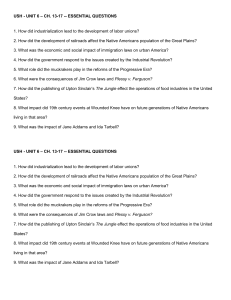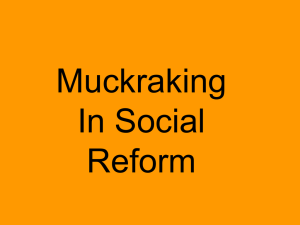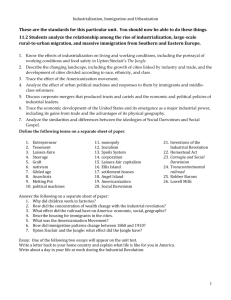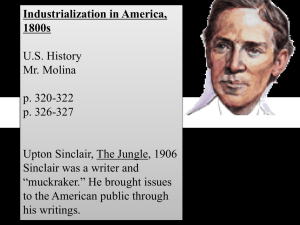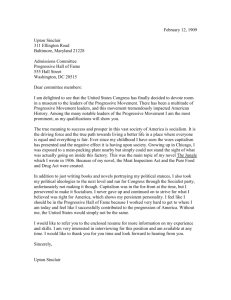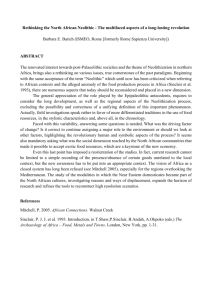Upton Sinclair: Rise of the Progressive American Muckraker
advertisement
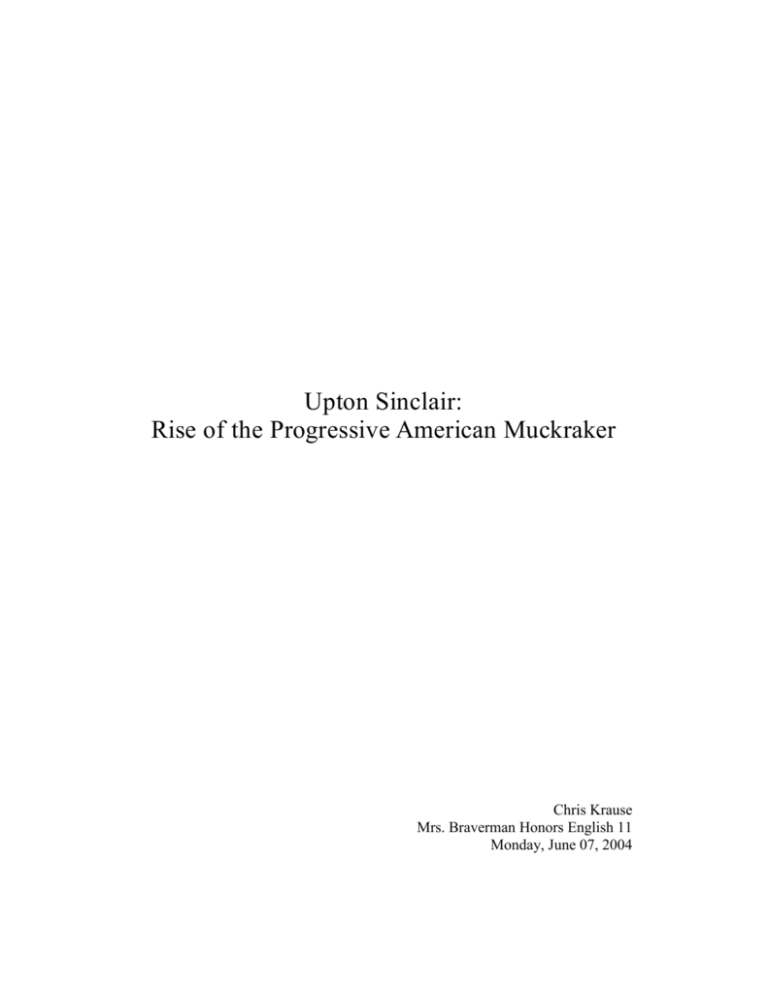
Upton Sinclair: Rise of the Progressive American Muckraker Chris Krause Mrs. Braverman Honors English 11 Monday, June 07, 2004 Upton Sinclair: Rise of the Progressive American Muckraker Abstract "What is the chief end of man?--to get rich. In what way?--dishonestly if we can; honestly if we must." -- Mark Twain-1871 By the early nineteenth century the United States lay in domestic strife, plunged into a state of utter chaos by over forty years of Gilded Age economics. The American man, once subject to the natural evolution of a laissez fairei economy was now prey to the Robber Barons of big business (now ironically turning philanthropist by the turn of the century due to the beckoning of their own mortal demise), backed by corrupt government, shadows of the Credit Mobilierii and Black Fridayiii scandals observed during the Grant administration still seated firmly in the back of America’s mind. From this chaotic environment would come a new sort of crusader to expel the picturesque apparitions of a digressing American society, one which would use cunning investigative journalism and often sensational reports to entice the American public to action. These literary warriors would come to be known as muckrakers by the Roosevelt administration, implying that they inspected the muck of society and in doing so discovered the truth: corrupt government and its apathy and lack of concern for the suffering of the lower classes, most of the time. One man who would come to epitomize this style of journalism and perhaps was the most crucial writer of his era was Upton Sinclair, spearheading his attack on American factory conditions with A Captain of Industry (1906) and The Jungle (1906). In this paper we shall examine the life, times and impact of Upton Sinclair on the world as well as deconstruct his various novels, The Jungle being our primary document for dissection. Compiled by Chris Krause -1- Upton Sinclair: Rise of the Progressive American Muckraker Introducing Upton Sinclair as a revolutionary catalyst Was Upton Sinclair simply a skilled muckraker or perhaps something more? Did Upton Sinclair simply feed on sensational events to make a quick buck off of eagerly waiting citizens or did he begin a sort of revolutionary progressive change? Did Upton Sinclair have sincere concerns for the conditions of food processing factories or did he have a hidden agenda? Was Upton Sinclair a phony? Was Upton Sinclair a saint? Was Upton Sinclair a cannibal zombie monster who consumed small children and then hid under their beds, gnawing on their bones, lying in ambush for unsuspecting parents to arrive in the morning? Not quite, although it’s a possibility with some opinionated historiography. Upton Sinclair was by no doubt a revolutionary catalyst to beget change in a despairing, ruined, repulsive society and was an illuminating torch to bring about higher insight and compassion. His writings and commentary (The Jungle in particular) were crucial in the formulation of a unique Progressive Era as well as the passing of the Pure Food and Drugs Act (1906)iv and the Meat Inspection Act (1906)v among other things. In this matter, Sinclair was able to show that journalists could make a difference. Although his influence waned in the years after The Jungle, he got the ball rolling for the Progressive Movement which would take hold as a force of reform by the Wilson administration. We can even be so bold as to declare that if Sinclair had not written The Jungle and other pieces which confronted the government directly about the problems which ailed the post-Gilded Age society that the Progressive Era may have had much less of a staying effect and thus changed the overall qualities of the country in this day and age. Compiled by Chris Krause -2- Upton Sinclair: Rise of the Progressive American Muckraker The Gilded Age (1878-1889) To understand the essence of Sinclair’s writings and the sincerity of his commentary we first must understand what he had risen to combat. The Gilded Age is generally considered to stretch from post-Reconstruction (1878)vi well into the early 1900s (1889) and was characterized by growth of new, modernized industry (moving away from the farms) and a influx of “new” immigrants, human beings which would be utilized as a cheap, flowing labor force for the Captains of Industry to follow. The production of iron and steel rose radically and western resources such as lumber, gold, and silver increased the demand for improved transportation (such as rail systems, steam power and early automobiles). Railroad expansion soared as trains moved merchandise from the resource-rich West to the crowded factories of the Eastern seaboard. Steel and oil were in immense demand. This commerce produced a good deal of wealth for a number of businessmen like John D. Rockefeller (for oil) as well as Andrew Carnegie (for steel), who would come to be known as robber barons (individuals whom got wealthy through brutal business deals, strong-arm tactics and corrupt governmental aid). The Gilded Age’s name derives from the apparent fortunes amassed during its duration and the almost fabricated existence many of the upperelite enjoyed. In truth the name is a metaphor: gilded means gold tinted, Mark Twain (in writing a novel of the same name and shipping to Washington DC as a sort of mockery) meant to describe the surreal appearance of the American society, a society which looked beautiful on the outside but was in actuality corrupt, disgusting and flawed. Compiled by Chris Krause -3- Upton Sinclair: Rise of the Progressive American Muckraker The Progressive Era By the turn of the twentieth century, muckraking journalists were calling national attention and support to reform the misuse of child labor, corruption in city “political machines”vii, the terror of lynching and other crass violent acts, and the coldblooded business tactics employed by businessmen such as John D. Rockefeller (Who coincidentally now was turned philanthropist). At the local level all throughout the country, many Progressives intended to contain redlight districts, develop high schools, construct playgrounds, and replace corrupt urban political machines with more sincere methods of metropolitan government. At the local state level, Progressives enacted minimum wage laws for women workers, instituted industrial accident insurance, restricted child labor, and improved factory regulation. At the national level, Congress passed laws establishing federal regulation of the meatpacking, drug, and railroad industries (mostly fueled by Teddy Roosevelt after he had read The Jungle), and strengthened anti-trust laws. It also lowered the tariff, established federal control over the banking system, and enacted legislation to evolve working conditions. Four constitutional amendmentsviii were adopted during the Progressive era, which sanctioned an income tax, provided for the direct election of senators, extended the vote to women, and banned the manufacture and sale of alcoholic drinks. Progressivism is an umbrella label for an extensive variety of economic, political, social, and moral reforms. These incorporated efforts to forbid the sale of alcohol; control child Compiled by Chris Krause -4- Upton Sinclair: Rise of the Progressive American Muckraker labor and sweatshops; methodically administer natural resources; insure pure and wholesome water and milk; Americanize immigrants or restrict immigration altogether; and bust or regulate trusts. Drawing support from the urban, college-educated middle class, Progressive reformers sought to eliminate corruption in government, regulate business practices, address health hazards, improve working conditions, and give the public more direct power over government through direct primaries to nominate candidates for civil office, direct election of Senators, the initiative, referendum, and recall, and women's suffrage among other things. The Life and Times of Upton Sinclair (The following biography is utilized as reference material, courtesy Spartacus Educational)ix Sinclair's next few novels such as The Overman (1907), The Metropolis (1908), The Moneychangers (1908), Love's Pilgrimage (1911) and Sylvia (1913) were commercially unsuccessful. In 1914 Sinclair moved to Croton-on-Hudson, a small town close to New York City where there was a substantial community of radicals living including Max Eastman, Floyd Dell, Robert Minor, Boardman Robinson and Inez Milholland. He also pleased his socialist friends with his anthology of social protest, The Cry for Justice (1915). John Reed wrote to Sinclair that his "anthology has made more radicals than anything I ever heard of". Compiled by Chris Krause -5- Upton Sinclair: Rise of the Progressive American Muckraker Initially, members of the Socialist Party had argued that the First World War had been caused by the imperialist competitive system and were opposed to the United States becoming involved in the conflict. However, news of the atrocities carried out by German soldiers in Belgium convinced some members that the United States should join the Allies against the Central Powers. Sinclair took this view and began arguing this case in the radical journal, The Masses. Its editor, Max Eastman and John Reed, who had been to the Western Front and Eastern Front as a war reporter, disagreed and argued against him in the journal. The issue split the Socialist Party and eventually Sinclair resigned from the party over it. After the USA declared war on the Central Powers in 1917 the Espionage Act was passed and this resulted in several of Sinclair's socialist opponents, being imprisoned for their opposition to the war. Sinclair now took up their case and when Eugene Debs, was imprisoned Sinclair wrote to Woodrow Wilson arguing that it was "futile to try and win democracy abroad, while we are losing it at home." Sinclair continued to write political committed novels including King Coal (1917) based on an industrial dispute and Boston (1928) on the Sacco-Vanzetti Case. He also wrote books about religion (The Profits of Religion, 1918), newspapers (The Brass Check, 1919) and education (The Goose-Step, 1923 and The Goslings, 1924). Sinclair rejoined the Socialist Party and in 1926 was its candidate to become governor of California. The following year he wrote an article for The Nation where he admitted he had been wrong about the First World War. Compiled by Chris Krause -6- Upton Sinclair: Rise of the Progressive American Muckraker In 1934 Sinclair once again stood as a candidate to become governor of California. He lost, but his EPIC program (End Poverty in California) gained considerable support and this time he won 879,537 votes against the winner's 1,138,620. In 1940 World's End launched Sinclair's 11 volume novel series on American government. His novel Dragon's Teeth (1942) on the rise of Nazism won him the Pulitzer Prize. By the time Upton Sinclair died in November, 1968, he had published more than ninety books. Progressive Reform and Impact A. Election of new reform mayors such as Hazen Pingree of Detroit, Samuel Jones of Toledo started the ball rolling in regards to active commitment of local level governments to reform-minded action. B. Massive Changes in city government and administration by means of a commissioner type of government, in which experts who are best suited for an overseer position, are committed as civil servants to fill a specific administration position required within a city or region (example: Commissioner of Police, Commissioner of Taxation etc). Also beginning to appear at this time was the council/manager type of government, in which a council elects laws and managers to cater to specialized interests of the city as civil servants. C. Election of progressive governors such as Robert La Follette, Wisconsin - Robert M. "Fightin' Bob" LaFollette (1855-1925)--Progressive Era political leader who served as US Compiled by Chris Krause -7- Upton Sinclair: Rise of the Progressive American Muckraker Congressman 1885-1891, governor of Wisconsin from 1900-1905 and U.S. Senator 19051925. In 1924 he ran as an independent Progressive candidate for President, polling nearly 6 million votes out of some 30 million cast, but won only Wisconsin's electoral votes. Other notable figures were Charles Ayacock, North Carolina and John A. Johnson, Missouri. D. State Reforms 1. Oregon System (Efforts of private citizen William S. U'Ren) * Secret Ballot * Initiative - The idea that a citizen could introduce legislation. * Recall - The ability of citizens to recall an elected official. * Referendum - A Yes/No on critical issues held by citizens. 2. Direct Primary first in Wisconsin in 1903. (As opposed to choice by machine) 3. Led to direct election of Senators in the 17th Amendment - 1913 (As opposed to choice by legislature.) E. Progressive Legislation 1. Child labor lawx 2. Pure Food and Drug act (1906) 3. Meat Inspection Act (1906) Compiled by Chris Krause -8- Upton Sinclair: Rise of the Progressive American Muckraker Discussion Upton Sinclair was a revolutionary catalyst. He was revolutionary in that he not only defined modern muckraking and investigative journalism as a field but also began the long road of repairing the damage the Gilded Age had done to the American people, including a Progressive road to reform spearheaded by his most important admirer, Teddy Roosevelt. Upton was the first journalist to have any real, long standing impact on society, and his Progressive fervor, although often interlaced with socialist ideals, still persists through society to this day with potent spirit and continued realization. As various Sinclair works such as Captains of Industry and especially The Jungle were embraced and digested by the general public, an interest in active evaluation of the government (Which was then riddled with corruption) began to take root in society, a battle against deception that is still being waged today. Roosevelt was so moved by his initial reading of The Jungle that he declared that all meat packing and food industries would be inspected thoroughly, a promise that he followed through to the best of his ability. Big business finally knew what it meant to fear, finally would be dealt justice, by the common man. We can validate the concept that Sinclair truly was a dynamic revolutionary force by examining the following criteria in detail: his direct effect on the domestic awareness of the common man, on the government and its practices and finally its economic impacts. Compiled by Chris Krause -9- Upton Sinclair: Rise of the Progressive American Muckraker Social Awareness Inspired by Sinclair’s Work The term "The Gilded Age" comes from a novel of the same name published in 1873 by Mark Twain and Charles Dudley Warner, which, though fictional, is a critical examination of politics and corruption in the United States during the nineteenth century. Before muckraking and Sinclair’s work was of much popularity or renown, the average American was basically kept in the dark at all times by corrupt government which openly supported evil big business and corporate scheming (sort of like how Bush gave all executive oil assets in conquered Iraq to Halliburton Co., Cheney’s personal oil company). It was not uncommon for the government to publicly deny matters which would place them libel (like Reagan’s Iran contra) and to assume positions of power through shady deals (Teapot Dome Scandalxi), the spoils system or literally cheating. The government and big business basically exploited the people at any possible juncture for individual gain and the congress and Supreme Court always favored big business when a worker dare challenge those who would seek to oppress him. Unions were actually illegal up until the late 1800s as were labor strikes or any sort of organized effort to oppose employers. Even when legalized, unions were looked down upon by most of society due to America’s foolish faith in the doctrinaire “Social Gospel.”xii The idea was that the actions of workers attempting to disrupt the workflow to make a point was counterproductive to the entire scheme of one role as Christians and productive citizens within society thus unionization or any sort of representation of workers rights was suppressed in a environment in which “kill or be killed” was not only acceptable but the norm. Compiled by Chris Krause - 10 - Upton Sinclair: Rise of the Progressive American Muckraker As industrialization and a consumer society took hold and the agrarian life lost its important in society, Americans became much more easier to control and concentration of power in the hands of the government increased at all levels - local, state, and federal. Government during this period assumed more authority and power, especially expanding its bureaucratic control and authority. Major areas of expansion of government power included land policy, railroad subsidies, tax/tariff policy, immigration policy, and Indian policy. As Americans became increasingly bitter a group of investigate journalists would emerge to sensationalize supposed events of contempt instituted by the government in order to entice the public to action, either to reform the government or buy more of their newspapers! By 1906 the combined sales of the ten magazines that concentrated on investigative journalism reached a total circulation of 3,000,0000. Writers and publishers associated with this investigative journalism movement between 1890 and 1914 included Henry Demarest Lloyd , Nellie Bly, Jacob A. Riis, Frank Norris, Ida Tarbell, Charles Edward Russell, Lincoln Steffens, David Graham Phillips, C. P. Connolly, Benjamin Hampton, Upton Sinclair, Thomas Lawson, Alfred Henry Lewis and Ray Stannard Baker. With Sinclair and The Jungle spearheading the attack on corrupt government and business practices, society would mutate, seemingly overnight. As Theodore Roosevelt pulled national attention to Sinclair’s works and they were perceived more eagerly by the general public, a new spirit of defiance and anxiousness developed between the typical American and the “powers that be.” No longer would cat and dog remains be acceptable in one’s hotdog, chemical solvents be consumed at dinner alongside shrunken pieces of mold covered poultry, nor would 10 cents wage a day be acceptable or the horrible factory Compiled by Chris Krause - 11 - Upton Sinclair: Rise of the Progressive American Muckraker conditions subject to the cheap immigrant workforce coming off the boats day by day. The average man would no longer accept having his tax dollars pocketed by money hungry senators or his ballot being discarded in the trash as soon as he placed it. Things would change, and Upton was the primary spirit behind the movement, with The Jungle being canonized into the new Progressive manifesto. Sinclair (The Jungle) and Government President Theodore Roosevelt responded to investigative journalism (and Sinclair’s The Jungle) by initiating legislation that would help tackle some of the problems illustrated by these journalists. This included persuading Congress to pass reforms such as the Pure Food and Drugs Act (1906) and the Meat Inspection Act (1906). The Pure Food and Drugs Act proposed: * Prevention of the manufacturing, sale, and transportation of adulterated, misbranded, poisonous, or spoiled drugs, foods, and liquors. * Prevention of the shipping of aforementioned goods to or from foreign countries. * Creation of uniform regulations and standards of purity (guidelines established by the Bureau of Chemistry). * Ensure that companies cannot make false claims about their products and their effects. * Provide consumers with a table of ingredients as well as the quantity of each. Compiled by Chris Krause - 12 - Upton Sinclair: Rise of the Progressive American Muckraker * Alert consumers of potentially lethal drugs in their medicines. * Allow purity tests on random samples of food from various parts of the nation. The Meat Inspection Act proposed: * Detection and destruction of diseased meat and/or contaminated meat. * Assurance of clean and sanitary handling and preparation * Minimization of microbiological contamination of meat. * Prevention of adulteration (the addition of harmful substances or products considered improper in certain specified quantities) and the presence of chemical or drug residues. * Prevention of false labeling. * Application of inspection insignia. These acts did not simply infringe on the ability of big business to cut corners and exploit the consumer but they also essentially rocked the very essence of their existence. Although these acts specifically targeted food and drugs, the meaning behind the acts, the concept that businesses would be suspect to inspection and deconstruction to better the common man persisted to influence later muckraking and Progressive campaigns- such as the struggle to get safe working conditions, equality within the workplace and even to a minor degree, women’s suffrage. Thus it is ineffective and perhaps foolhardy to simply examine these acts on face value, the meaning behind them, the concept, would persist as crucial Compiled by Chris Krause - 13 - Upton Sinclair: Rise of the Progressive American Muckraker developments as time progressed. From this point on, it would be acceptable to question business to ensure the lawful operation of their corporation while in times before it was thought to violate the “kill or be killed” nonsense of the “Social Gospel.” Although Upton may have only directly affected the passing of these two acts they are significant because it opened the door to further Progressive litigation. Sinclair’s Effective Fiscal Impact It is safe to say that Upton Sinclair’s effective impact on the operation of greedy, corrupt corporations was staggering to say the very least. The entire American economic community was inspected and filtered; those who had practiced unlawful business practices were eliminated (also included “trust busting” or the breaking up of corporate monopolies) or possessed by the central government and then sold off. The Progressive Era which would be the brainchild of Woodrow Wilson but was fundamentally fueled by muckraker spirit from the post-Gilded Age would mark the final days of international trusts and monopolies as well as unsanitary conditions in the workplace. All of these factors helped to decimate Gilded Age corruption and thus significantly impact the fiscal output of the United States during the time. Furthermore it would adopt a new standard for emerging products and would help in shaping the modern consumer market, an environment where the best product at the lowest price always is in demand over monopolized items or contaminated food for example. Sinclair helped revolutionize the entire economic philosophy and method of his era which led to today’s modern market. Compiled by Chris Krause - 14 - Upton Sinclair: Rise of the Progressive American Muckraker Conclusion Upton Sinclair was perhaps one of the most crucial journalists to ever live and his essential commentary expressed through The Jungle, although at times idealist (not to mention socialist), helped shape our modern society. Without Upton’s critical analysis of the meat packing industry (and thus big business) we may have been still eating polluted, solvent soaked, mold covered animal carcasses today. The very essence of his work promoting the concept that no stone should be left unturned is still the basis of most investigative journalism and journalism in general to this day. Upton will always be remembered as a seminal Progressive Era co-founder as well as a man who cared about the wellbeing of humanity, seeking to end the evils being wrought by the raging, seemingly unstoppable corporations. Although his time has passed, his message still holds strong today (this paper is proof enough) as it always will, as long as powerful men find it necessary to oppress and exploit the meek and ignorant. Compiled by Chris Krause - 15 - Upton Sinclair: Rise of the Progressive American Muckraker Upton Sinclair’s Accredited Bibliography * COURTMARTIALED, 1898 (adventure story) * SAVED BY THE ENEMY, 1898 (adventure story) * THE FIGHTING SQUADRON, 1898 (adventure story) * A PRISONER OF MORRO, 1898 (adventure story) * A SOLDIER MONK, 1898 (adventure story) * A GAUNTLET OF FIRE, 1899 (adventure story) * HOLDING THE FORT, 1899 (adventure story) * A SOLDIER'S PLEDGE, 1899 (adventure story) * WOLVES OF THE NAVY, 1899 (adventure story) * SPRINGTIME HARVEST, 1901 * THE JOURNAL OF ARTHUR STIRLING, 1903 * OFF FOR WEST POINT, 1903 (adventure story) * FROM PORT TO PORT, 1903 (adventure story) * ON GUARD, 1903 (adventure story) * A STRANGE CRUISE, 1903 (adventure story) * THE WEST POINT RIVALS, 1903 (adventure story) * A WEST POINT TREASURE, 1903 (adventure story) * A CADET'S HONOR, 1903 (adventure story) Compiled by Chris Krause - 16 - Upton Sinclair: Rise of the Progressive American Muckraker * CLIFF, THE NAVAL CADET, 1903 (adventure story) * THE CRUISE OF THE TRAINING SHIP, 1903 (adventure story) * PRINCE HAGEN, 1903 * MANASSAS, 1904 * A CAPTAIN OF INDUSTRY, 1906 * THE JUNGLE, 1906 - Chicago * THE OVERMAN, 1907 * THE INDUSTRIAL REPUBLIC, 1907 * THE METROPOLIS, 1908 * THE MONEY CHANGERS, 1908 - Rahanvaihtaja eli Pörssiylimys (suom. Yrjö Sirola) * SAMUEL, THE SEEKER, 1909 * GOOD HEALTH AND HOW WE WON IT, 1909 (with M. Williams) * LOVE'S PILGRIMAGE, 1911 * THE MACHINE, 1911 * THE FASTING CURE, 1911 * THE NATUREWOMAN, 1912 * PLAYS PROTEST, 1912 * DAMAGED GODS, 1913 * SYLVIA, 1913 Compiled by Chris Krause - 17 - Upton Sinclair: Rise of the Progressive American Muckraker * THE SINCLAIR-ASTOR LETTERS, 1914 * SYLVIA'S MARRIAGE, 1914 * THE CRY FOR JUSTICE, 1915 * KING COAL, 1917 - Kuningas kivihiili * THE PROFITS OF RELIGION, 1918 * JIMMY HIGGINS, 1919 * THE BRASS CHECK, 1919 * THE STORY OF A PATRIOT, 1920 * THE BOOK OF LIFE: MIND, AND BODY, 1921 * PRINCE HAGEN, 1921 (play) * THEY CALL ME CARPENTER, 1922 * THE BOOK OF LIFE: LOVE AND SOCIETY, 1922 * THE GOOSE-STEP, 1923 * HELL, 1923 * THE GOSLINGS, 1924 * THE POT BOILER, 1924 * SINGING JAILBIRDS, 1924 * 100%. THE STORY OF A PATRIOT, 1924 - 100% Erään isänmaanystävän tarina * THE MILLENNIUM, 1924 * MAMMONART, 1925 - Taide ja mammona Compiled by Chris Krause - 18 - Upton Sinclair: Rise of the Progressive American Muckraker * LETTERS TO JUDD, AN AMERICAN WORKING MAN, 1926 * OIL!, 1927 - Öljyä * MONEY WRITES, 1927 * BOSTON, 1928 * OIL!, 1929 (from his novel) * MOUNTAIN CITY, 1930 * MENTAL RADIO, 1930 * ROMAN HOLIDAY, 1931 * THE WET PARADE, 1931 * AMERICAN OUTPOST: A BOOK OF REMINISCENCES, 1932 * THE WET PARADE, 1932 (from his novel) * CANDID REMINISCENCES, 1932 * U.S. PRESENTS WILLIAM FOX, 1933 * I, GOVERNOR OF CALIFORNIA, AND HOW I ENDED POVERTY, 1933 * UPTON SINCLAIR PRESENTS WILLIAM FOX, 1933 * THE BOOK OF LOVE, 1934 * EPIC PLAN FOR CALIFORNIA, 1934 * DEPRESSION ISLAND, 1935 * I, CANDIDATE FOR GOVERNOR, AND HOW I GOT LICKED, 1935 * CO-OP, 1936 Compiled by Chris Krause - 19 - Upton Sinclair: Rise of the Progressive American Muckraker * THE GNOMOBILE, 1936 * WALLY FOR QUEEN, 1936 * WHAT GOD MEANS TO ME, 1936 * THE FLIVVER KING, 1937 * NO PASARÁN!, 1937 - Taistelu Madridista * OUR LADY, 1938 * LITTLE STEEL, 1938 * OUR LADY, 1938 * TERROR IN RUSSIA? 1938 * MARIE ANTOINETTE, 1939 * LETTERS TO A MILLIONAIRE, 1939 * WORLD'S END, 1940 * BETWEEN TWO WORLDS, 1941 * DRAGON'S TEETH, 1942 - Pulitzer Prize * WIDE IS THE GATE, 1943 * THE PRESIDENTIAL AGENT, 1944 * DRAGON HARVEST, 1945 * A WORLD TO WIN, 1946 * PRESIDENTIAL MISSION, 1947 * A GIANT'S STRENGTH, 1947 Compiled by Chris Krause - 20 - Upton Sinclair: Rise of the Progressive American Muckraker * U.S. ANTHOLOGY, 1947 * LIMBO ON THE LOOSE, 1948 * ONE CLEAR CALL, 1948 * A GIANT'S STRENGTH, 1948 * O SHEPHERD SPEAK!, 1949 * ANOTHER PAMELA, 1950 * THE ENEMY HAD IT TOO, 1950 * A PERSONAL JESUS, 1952 * THE RETURN OF LARRY BUDD, 1953 * WHAT DIDYMUS DID, 1954 * THE CUP OF FURY, 1956 * IT HAPPENED TO DIDYMUS, 1958 * MY LIFETIME IN LETTERS, 1960 * AFFECTIONATELY EVE, 1961 * THE AUTOBIOGRAPHY OF UPTON SINCLAIR, 1962 * SERGEI EISENSTEIN AND UPTON SINCLAIR: THE MAKING AND UNMAKING OF 'QUE VIVA MEXICO!', 1970 (ed. H.M. Geduld, R. Gottesman) Compiled by Chris Krause - 21 - Upton Sinclair: Rise of the Progressive American Muckraker Works Cited Van Wyck Brooks, "Upton Sinclair and His Novels," Sketches in Criticism, Dutton, 1932, pp. 291-98. Bernard Dekle, "Upton Sinclair: The Power of a Courageous Pen," Profiles of American Authors, Tuttle, 1969, pp. 70-74. Melvyn Dubofsky, 'Big Bill' Haywood, St. Martin's Press, 1987. James R. Green, The World of the Worker: Labor in Twentieth-Century America, Hill and Wang, 1980. Granville Hicks, "The Survival of Upton Sinclair," College English, Vol. 4, no. 4, January, 1943, pp. 213-220. Daniel Nelson, Shifting Fortunes: The Rise and Decline of American Labor, from 1920 to the Present, Ivan R. Dee, Inc., 1997. Walter B. Rideout, The Radical Novel in the United States, 1900-1954: Some Interrelations of Literature and Society, Harvard University Press, 1956. Bloodworth, William. Upton Sinclair. Boston: Twayne Publishers. 1977. Harris, Leon. Upton Sinclair: American Rebel. New York: Thomas Y. Crowell, Co. 1975 1991. Compiled by Chris Krause - 22 - Upton Sinclair: Rise of the Progressive American Muckraker Scott, Ivan. Upton Sinclair, the Forgotten Socialist. Lewiston, New York: Edwin Mellen Press, 1997. Sinclair, Upton. The Autobiography of Upton Sinclair. New York: Harcourt, Brace & World, Inc. 1962. Sinclair, Upton. The Jungle. New York: Grosset & Dunlap. 1906. http://www.spartacus.schoolnet.co.uk/Jupton.htm i (Fr. ‘let (people) do (as they please’) A term used to describe and sometimes advocate for a government’s "hands off" relationship to the economy, i.e., the government should avoid trying to improve or direct the economy in any way and collect and re-distribute only that money absolutely necessary for the survival of the nation. Advocated by Adam Smith as a counter doctrine to mercantilism and supported by most neo-liberal capitalists today. [ www.bothell.washington.edu/faculty/bkochis/bls362/glossary.htm ] ii "The Credit Mobilier scandal of 1872-1873 damaged the careers of several Gilded Age politicians. Major stockholders in the Union Pacific Railroad formed a company, the Credit Mobilier of America, and gave it contracts to build the railroad. They sold or gave shares in this construction to influential congressmen. It was a lucrative deal for the congressmen, because they helped themselves by approving federal subsidies for the cost of railroad construction without paying much attention to expenses, enabling railroad builders to make huge profits.When the New York Sun broke the story on the eve of the 1872 election, Speaker of the House James G. Blaine, a Maine Republican implicated in the scandal, set up a congressional committee to investigate." [The Reader's Companion to American History (1991)] iii Sept. 24, 1869, in U.S. history, day of financial panic. In 1869 a small group of American financial speculators, including Jay Gould and James Fisk, sought the support of federal officials of the Grant administration in a drive to corner the gold market. The attempt failed when government gold was released for sale. The drive culminated on a Friday, when thousands were ruined—the day is popularly called Black Friday. There was great indignation against the perpetrators. Several other days of financial panic have also been occasionally referred to as Black Friday. [ courtesy Bartleby ] iv * Creation of the Food and Drug Administration, which was entrusted with the responsibility of testing all foods and drugs destined for human consumption * The requirement for prescriptions from licensed physicians before a patient could purchase certain drugs * The requirement of label warnings on habit-forming drugs. v * Detection and destruction of diseased meat and/or contaminated meat. * Assurance of clean and sanitary handling and preparation * Minimization of microbiological contamination of meat. Compiled by Chris Krause - 23 - Upton Sinclair: Rise of the Progressive American Muckraker * Prevention of adulteration (the addition of harmful substances or products considered improper in certain specified quantities) and the presence of chemical or drug residues. * Prevention of false labeling. * Application of inspection insignia. vi * 1863: Lincoln announces "10 Percent Plan." * 1865: Freedman's Bureau is established. o Lincoln is assassinated. o Johnson's amnesty plan. o Thirteenth Amendment is ratified. * 1866: Civil Rights Act is passed over Johnson's veto. * 1867: Alaska Purchased. o First Reconstruction Act. * 1868: Fourth Reconstruction Act. o Fourteenth Amendment is ratified. o Ku Klux Klan begins. * 1869: Belle Babb Mansfield becomes the first woman lawyer in the United States * 1870: Fifteenth Amendment is ratified. o Force Act * 1875: Civil Rights Act. * 1876: Battle of Little Bighorn. * 1877: President Hayes agrees to compromise of 1877. * 1881: Tuskeegee Institute is founded. * 1882: Chinese Exclusion Act passed. * 1887: Pearl Harbor acquired. * 1890-1900: Blacks are deprived of the vote in the South. * 1895: Booker T. Washington's Atlanta Compromise Speech. * 1896: Plessy vs. Ferguson. vii “What tells in holdin your grip on your district is to go right down among the poor families and help them. I've got a regular system for this. If there's a fire in Ninth or Tenth or Eleventh Avenue, for example, any hour of the day or night, I'm usually there with some of my election district captains as soon as the fore engines. If a family is burned out I don't I don't ask them if they are Republicans or Democrats, and I don't refer them to the Charity Organization Society, which would investigate their case in a month or two and decide if they are worthy of help about the time they are dead from starvation. I just get quarters for them, buy clothes for them if their clothes were all burned up, and fix them up until they get things runnin' again. It's philanthropy, but Compiled by Chris Krause - 24 - Upton Sinclair: Rise of the Progressive American Muckraker it's politics too - mighty good politics. Who can tell me how many votes one of those fires brings me? The poor are the most grateful people in the world, and, let me tell you, they have more friends in their neighborhoods than the rich have in theirs... Another thing, I can always get a deserving man a job. I make it a point to keep track of jobs, and it seldom happens that I don't have a few up my sleeve ready for use. I hear a young feller that's proud of his voice... I ask him to join our Glee Club. He comes up and sings, and he's a follower of Plunkitt for life. Another young feller gains a reputation as a baseball player in a vacant lot. I bring him into our baseball club. That fixes him. You'll find him working for my ticket at the polls next election. I rope them all in by givin' them opportunities to show off themselves off. I don't trouble them with political arguments.” -- George Washington Plunkitt, Politician, New York, 1889 viii 16th (1913) Granted Congress the power to tax income. 17th (1913) Provided for the direct election of U.S. Senators. 18th (1919) Prohibited making, selling, or transporting alcohol. 19th (1920) Provided women suffrage (voting). ix x [ http://www.spartacus.schoolnet.co.uk/Jupton.htm ] In the United States, numerous organizations worked to eliminate child labor, including the National Child Labor Commitee, lauched in 1904 by social workers. Public support came when journalists exposed the horrible conditions children worked in. Eventually, cities and states set forth guidelines limiting the number of hours that children could work. In 1916, President Wilson passed the Keating-Owen Act through Congress. This banned articles produced by child labor from interstate commerce. A 1918 Supreme Court ruling declared it unconstitutional. It was not until 1938, when the Fair Labor Standards Act was passed, did any attempt at child labor legislation succeed. This requires employers to pay child laborers the minimum wage. It also limits the age of child laborer to age 18 if the occupation in hazardous. Gradually conditions improved, but child labor has still not been wiped out. xi Teapot Dome, in U.S. history, oil reserve scandal that began during the administration of President Harding. In 1921, by executive order of the President, control of naval oil reserves at Teapot Dome, Wyo., and at Elk Hills, Calif., was transferred from the Navy Dept. to the Dept. of the Interior. The oil reserves had been set aside for the navy by President Wilson. In 1922, Albert B. Fall, U.S. Secretary of the Interior, leased, without competitive bidding, the Teapot Dome fields to Harry F. Sinclair, an oil operator, and the field at Elk Hills, Calif., to Edward L. Doheny. These transactions became (1922–23) the subject of a Senate investigation conducted by Sen. Thomas J. Walsh. It was found that in 1921, Doheny had lent Fall $100,000, interest-free, and that upon Fall's retirement as Secretary of the Interior (Mar., 1923) Sinclair also “loaned” him a large amount of money. The investigation led to criminal prosecutions. Fall was indicted for conspiracy and for accepting bribes. Convicted of the latter charge, he was sentenced to a year in prison and fined $100,000. In another trial for bribery Doheny and Sinclair were acquitted, although Sinclair was subsequently sentenced to prison for contempt of the Senate and for employing detectives to shadow members of the jury in his case. The oil fields were restored to the U.S. government through a Supreme Court decision in 1927. [http://www.infoplease.com/ce6/history/A0848032.html ] xii Social gospel, also known as Christian socialism, was a moral reform movement of the late nineteenth century that helped pave the way for the progressive movement. Rapid urbanization and industrialization in the 1880s and 1890s aroused the interest of many Protestant clergymen in the need to secure social justice for the poor. Compiled by Chris Krause - 25 - Upton Sinclair: Rise of the Progressive American Muckraker They aimed to expand their appeal in the cities, where the Roman Catholic church was especially popular among the large immigrant population. The leaders of the social gospel movement were Washington Gladden, who sympathized with workers and urged them to seek unity in Christianity, William Dwight Porter Bliss, who worked with the Knights of Labor and the Socialist party, and especially Walter Rauschenbusch, a Baptist minister in New York City who called for a democratic cooperative society to be achieved by nonviolent means. The social gospel movement had mixed results. It attracted a number of followers and helped liberalize organized religion and link Christianity with progressivism. It contributed to the efforts of political and social reformers like Theodore Roosevelt, Woodrow Wilson, and Jane Addams, and economist Richard Ely, all of whom were moved to look at reform in moral terms. But it failed to win over many urban immigrants, and it proposed few lasting solutions to urban problems. Compiled by Chris Krause - 26 -

